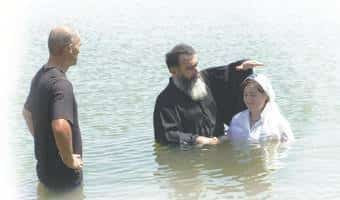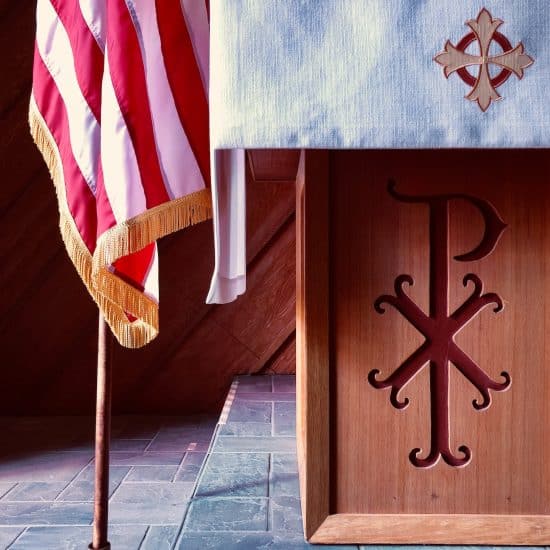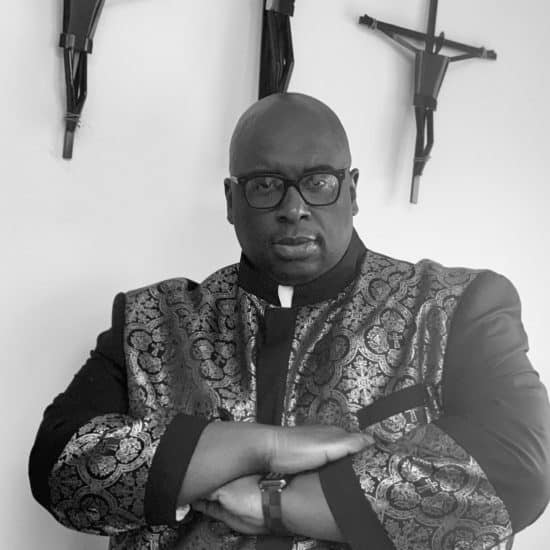RICHMOND, Va.—When war erupted between Russia and Georgia in 2008, repercussions included more than the 2,000 deaths and tens of thousands of refugees attributed to the conflict. Casualities also included relations between the two countries’ Baptist fellowships, torn between patriotism and historic spiritual ties.

First Baptist Church in Gori, near Georgia’s border with Ossetia, last year baptized nine new believers—the church’s first baptism service in a decade. The church was at the center of fighting during the war between Russia and Georgia in 2008. Bishop Ilia Osefashvili of the Evangelical Baptist Church of Georgia baptized the converts.
|
Russian and Georgian Baptists later pledged to “facilitate the process of forgiveness and reconciliation between our peoples.” But the dispute highlights one of many challenges political realities pose for Christians around the world in balancing love of country and loyalty to a higher authority.
In the 15 years before fighting broke out in the Caucasus, friendship between Baptists in Russia and Georgia was strained by the collapse of the Soviet Union and Georgia’s subsequent independence. Georgian Baptists’ new national loyalty led them out of the Union of Evangelical Christians-Baptists and to the creation of the Evangelical Baptist Church of Georgia.
The brutal war might have severed ties completely. But in November 2008, Baptist leaders—Malkhaz Songulashvili and Merab Gaprin-dashvili for the Georgians, and Yuri Sipko and Vitaly Vlasenko for the Russians—set aside nationalism in order to “promote mutual cooperation in the mission of God.”
Christians’ ability to transcend national pride while maintaining an appropriate patriotism especially is fraught in countries such as Russia, where national identity is associated closely with religion. Minority faiths frequently find themselves relegated to second-class status.
Last spring, a leader of the increasingly influential Russian Orthodox Church told a national television audience, “It is obvious today that the nation and church are one.”
“The Russian people will again become a Christian nation, even if this does not please everyone,” said Archpriest Vsevolod Chaplin, who chairs the church’s Synod Office for Mutual Relations between Church and Society. What’s more, he continued, the West—including the United States—has lost its Christian distinctiveness and only Russia can offer “the most positive future.”
William Yoder, a spokesman for Russian Baptists’ external church relations department, said some members of his denomination are ambivalent in their response to a patriotism with religious overtones. On the one hand, many “see in the struggle for ‘traditional Christian values’ a common cause for cooperation with the Orthodox,” he said. On the other, the “views of Protestants and conservative Orthodox on the interpretation of the Russian past and present are far apart.”
Still, Russian history retains a strong pull on the country’s Baptists and their patriotism. Last year, a bomb seriously damaged a statue of Lenin in front of St. Petersburg’s Finlandsky Station, one of the city’s main train terminals. In response, Vitaly Vlasenko of the external church relations department said: “I think monuments should remain in place, even if they represent ideologies and leaders different from our own. We need to honor our past, regardless of its negative aspects.”
In contrast to Russia’s religious-tinged patriotism, China remains an officially atheistic nation. Nevertheless, China’s burgeoning Christian population—now numbering in the millions—often reflects pride in the nation’s economic advances and growing world stature.
Last year, during 60th anniversary celebrations of the Three-Self Patriotic Movement—China’s government-regulated Protestant church organization—admonitions to “love the country, love the church” were frequent.
“Chinese society is experiencing enormous and historic change at present,” claimed an editorial in the church monthly magazine Tian Feng.
“Chinese Christianity cannot stand aloof from these changes, but in fact has already become a part of them. Christians must not only connect with God, but must act in accordance with God’s teaching and connect with their homeland, society and people from all walks of life.”
Lin Manhong, a minister affiliated with Nanjing Union Theological Seminary, told the magazine, “Guiding our believers to identify with and share a common destiny with their country and compatriots and to join with them in building a harmonious society—this is what it means to love the country.”
Expressions of patriotism might be expected from leaders of China’s state-controlled churches. But even targets of recent crackdowns on illegal “house churches” maintain their national loyalty.
“We are not anti-government,” Wei Na, choir director of the embattled Shou-wang Church told the New York Times this spring. “But we cannot give up our church family and our faith.”
The 1,000-member Shou-wang Church in Beijing, which operates outside the state-controlled system but had benefitted from the government’s wary tolerance of big-city, unregistered congregations, was evicted from its meeting place in a new wave of crackdowns. Rather than disband or go back underground, the church determined to worship outside, sparking confrontation with police.
Even so, church supporters stress their patriotism in asking the government to change its tactics.
“We hope … the government will be able to handle the Shouwang incident in a rational and wise manner on the basis of the principles of ‘putting the people first and ruling the country by law’ and in the gracious spirit of serving the citizens …,” a petition to authorities said.





